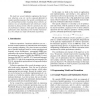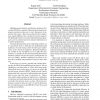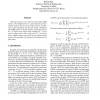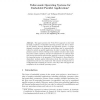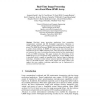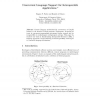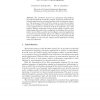123
Voted
IPPS
1999
IEEE
15 years 6 months ago
1999
IEEE
We study how several collective operations like broadcast, reduction, scan, etc. can be composed efficiently in complex parallel programs. Our specific contributions are: (1) a fo...
120
click to vote
IPPS
1999
IEEE
15 years 6 months ago
1999
IEEE
A structured approach to parallel programming allows to construct applications by composing skeletons, i.e., recurring patterns of task- and data-parallelism. First academic and co...
154
Voted
IPPS
1999
IEEE
15 years 6 months ago
1999
IEEE
Multidimensional Analysis and On-Line Analytical Processing (OLAP) uses summary information that requires aggregate operations along one or more dimensions of numerical data value...
122
click to vote
IPPS
1999
IEEE
15 years 6 months ago
1999
IEEE
This paper proposes a method for reducing the maximum degree of vertices in graphs that maintain optimal broadcast time when a vertex can call a vertex at distance at most k durin...
104
click to vote
IPPS
1999
IEEE
15 years 6 months ago
1999
IEEE
This paper proposes a new memory system called shuffle memory. The shuffle memory is a generalization of transposition memory that has been widely used in 2-D Discrete Cosine Tran...
121
click to vote
IPPS
1999
IEEE
15 years 6 months ago
1999
IEEE
This paper presents the Pure/Epos approach to deal with the high complexity of adaptable operating systems and also to diminish the distance between application and operating syste...
IPPS
1999
IEEE
15 years 6 months ago
1999
IEEE
Job management subsystems in parallel environments have to address two important issues: (i) how to associate processes present in the system to the tasks of parallel jobs, and (ii...
115
click to vote
IPPS
1999
IEEE
15 years 6 months ago
1999
IEEE
Real-time image processing applications have tremendous computational workloads and I/O throughput requirements. Operation in mobile, portable devices poses stringent resource limi...
127
click to vote
IPPS
1999
IEEE
15 years 6 months ago
1999
IEEE
Current language mechanisms for concurrency are largely isolated to the domain of single programs. Furthermore, increasing interest in concurrent programming encourages further res...
116
click to vote
IPPS
1999
IEEE
15 years 6 months ago
1999
IEEE
The JavaPorts system is an environment that facilitates the rapid development of modular, reusable, Java-based parallel and distributed applications for networked machines with het...
